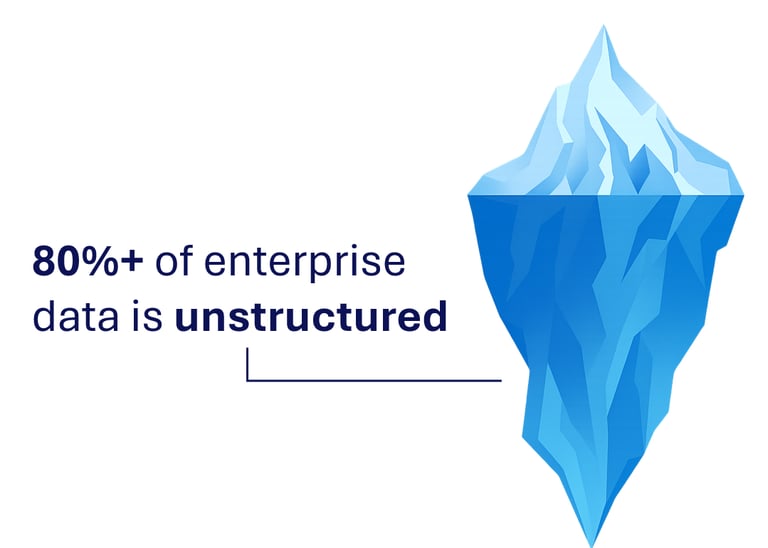Agentic Document Processing
The Next Frontier in Document Processing
Robyn Le Sueur
10/27/20253 min read


More than 80% of enterprise data is unstructured - buried in PDFs, emails, images, forms, and free-text notes. This wealth of information holds enormous value, yet it’s often locked away, inaccessible to traditional systems that were never designed to understand nuance, context, or ambiguity.
The Challenge of Unstructured Data
Unstructured data doesn’t fit neatly into rows and columns. It’s messy, inconsistent, and scattered across multiple systems. Extracting meaning requires understanding context - recognising whether “John Smith” is a claimant or a customer service representative, whether “policy expired” signals a risk, or whether a clause is compliant or not. For decades, organisations have relied on templates, manual review, and rigid rule-based automations to manage this complexity.
Traditional Document Processing and Its Limitations
Early “document intelligence” technologies focused on optical character recognition (OCR) and machine learning models trained for narrow use cases - like invoice extraction or form classification. These methods worked, but only when documents looked exactly as expected. When a format changed, the system broke. Scaling required expensive configuration, and maintaining accuracy meant constant retraining. The result? Incremental progress, but little true intelligence.
How Modern LLMs Changed the Game
The arrival of large language models (LLMs) transformed the landscape. Modern LLMs can process vast quantities of unstructured information, reason across context, and extract meaning far beyond simple keyword recognition. They can read, summarise, and even answer questions about a document - performing tasks once thought uniquely human. This shift has enabled unprecedented levels of accuracy, speed, and flexibility in document understanding.
Enter Agentic Document Processing
Agentic document processing represents the next frontier. Instead of merely reading and extracting, agentic systems act. They use specialised agents equipped with custom tools that decide how and when to clean, review, and process documents - much like a human would. These agents can:
Classify documents automatically
Extract and validate entities
Detect risk indicators or compliance issues
Highlight insights and anomalies for human review
The result is a system that doesn’t just process information - it understands and manages it intelligently.
Real-World Examples
Agentic document processing is already reshaping how organisations work. Imagine:
A Data Gathering Agent that collects and standardises information from incoming submissions.
An Inbox Monitoring Agent that detects intent, summarises emails, and routes them instantly.
A Claims Processing Agent that reviews policy documents, extracts loss details, and flags potential fraud - autonomously and at scale.
Each of these agents applies reasoning, decision-making, and adaptability, dramatically reducing human effort and improving accuracy.
The Complexity Behind the Scenes
Building truly agentic systems isn’t trivial. It demands a combination of context engineering, prompt optimisation, and tool orchestration, alongside deep business process understanding. It’s not just about technology - it’s about designing systems that think and act within real-world workflows. This requires expertise across data science, software engineering, and operational process design - a blend that few organisations possess internally.
How ADVANTIQ’s Discover Platform Solves This
This is where ADVANTIQ’s frontier platform, Discover, comes in. Built natively on Microsoft Azure, Discover encapsulates all the technical complexity - from context management and model selection to cost optimisation and workflow orchestration - within a single, simple API
Using Discover, organisations can:
Process and understand unstructured data at scale.
Configure and deploy document-processing workflows without writing code.
Use pre-built standard workflows for common tasks like email triage, claims assessment, or compliance review - deployable in days, not months.
It’s document intelligence made agentic, accessible, and enterprise-ready.
The Takeaway
Agentic document processing marks a turning point in how organisations handle unstructured data. It combines the reasoning power of modern AI with the autonomy of intelligent agents - creating systems that can act, adapt, and learn.
With DISCOVER, ADVANTIQ is leading this transformation - enabling you to process, understand, and query your unstructured data with ease and confidence.
Get in touch to book a demo and see how agentic document processing can unlock the true potential of your enterprise data.
Empowering organisations with AI-driven solutions today.
Connect
info@advantiq.com
© 2025. All rights reserved.
